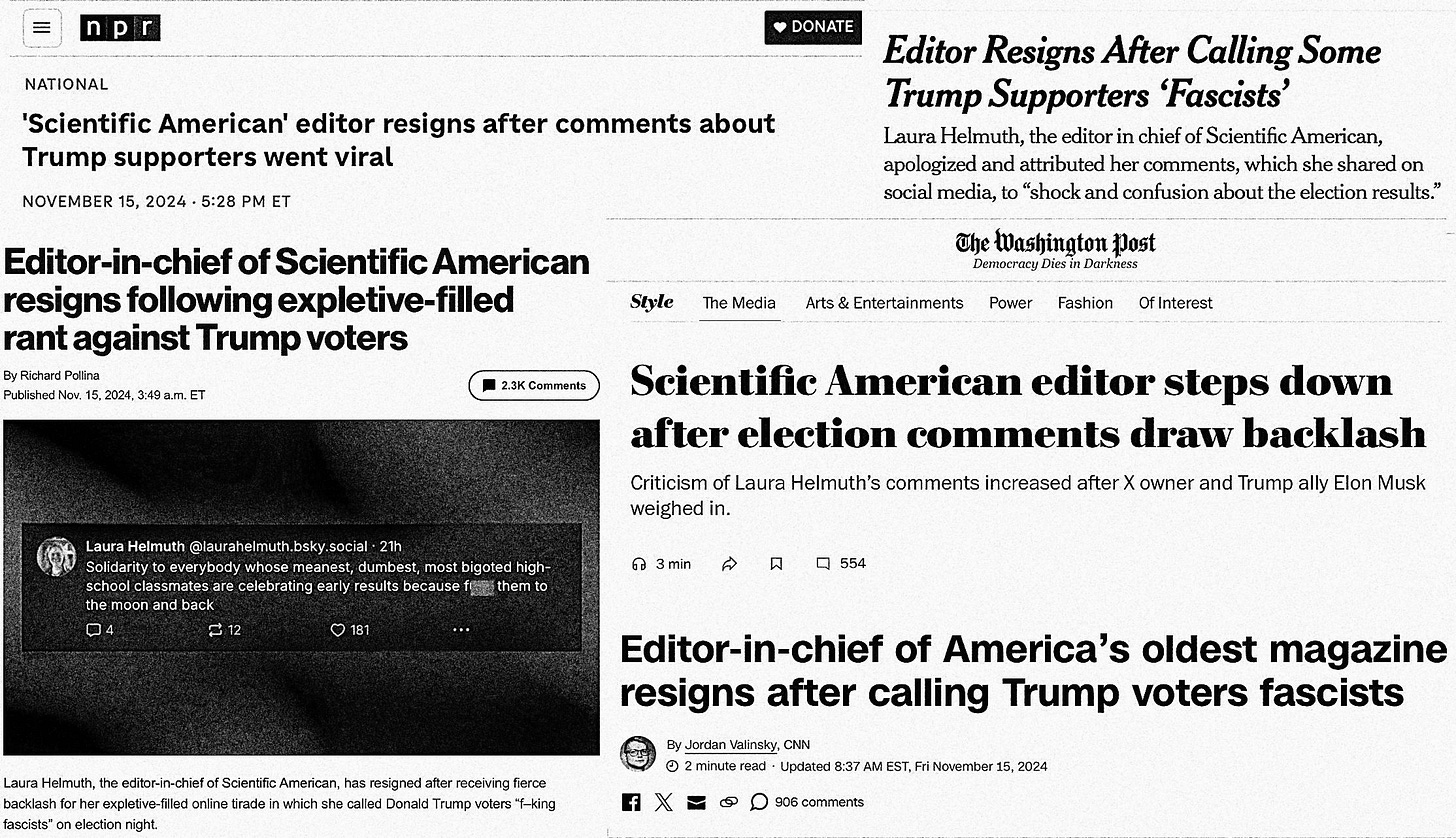Scientific American’s Purging of Laura Helmuth Is Only A Start
More work awaits science writing outlets needing to make an effort at journalism to recapture public trust.
5 minute read
Scientific American editor Laura Helmuth posted several hateful tweets after the election, calling Trump voters “fucking fascists” and then fake apologized claiming “I respect and value people across the political spectrum.” But phony regret didn’t save Helmuth from the adults in charge, and she later announced her resignation, with gossip floating that she left the job to avoid a firing.
Despite Helmuth’s claims that “I respect and value people across the political spectrum,” she reinforced her bigoted bona fides a few days back when she reposted a tweet on Bluecry that charged Trump’s people are “no different” from “original Nazis.”
Besides being a bigot, Helmuth is now a confirmed liar.
Tossing Helmuth out the door for partisan hate was the right decision, because her fanaticism was always obvious. But Helmuth’s unhinged politics is less a sickness than a symptom of an underlying pathology in science journalism. Too many science writers share Helmuth’s extremist views and disdain for the American public, and her staff betray many of the same fanaticism that has turned Scientific American into America’s laughingstock media outlet.
Back in 2021, I reported for The BMJ on Helmuth’s harassment of former CDC Director Robert Redfield, who had gone on CNN to say he was worried the pandemic started in a Wuhan lab. Redfield is an infectious disease expert who has a top secret security clearance. In an interview, he explained to me that not all the classified material he has seen has been made public.
Nonetheless, Laura Helmuth tweeted, “On CNN, former CDC director Robert Redfield shared the conspiracy theory that the virus came from the Wuhan lab.” Helmuth then claimed “Redfield is not an authority on the science” even though he obviously is.
Helmuth then sicced her deputy, Josh Fischman on Redfield. Like Helmuth, Fischman has zero background in infectious diseases nor a security clearance. However, Fischman can write long, tortuous thinky-pieces, that align with Laura Helmuth’s extreme biases.
Fischman came to mind again, when I started glancing through other pieces Scientific American published that skip over inconvenient science to promote specific ideology. A month back, Scientific American’s Dan Vergano reposted a tweet on Bluesky by Fischman that promoted another whacky Scientific American article. Vergano is Scientific American’s senior opinion editor.
In his tweet, Fischman claimed the “newest research indicates” that long COVID “not lockdowns” accounts for poor school performance by kids. This is all nonsense and speculation.
When you click on the story link, you find that Scientific American isn’t reporting the “newest research” but promoting an opinion piece written by an attorney who claims to study “health misinformation”—academic code for “health information I don’t like.”
When you cut through all the nonsense in the article—the speculation about the incidence of Long COVID and school performance—one passage makes clear that the essay is just a vaccine promotional ad, while another passage promotes masks, even though research finds masks don’t do much to stop viruses.
Only investors in Pfizer, corrupt physicians, and lunatics writing for Scientific American are still recommending that kids get COVID boosters. And when you click on the article link for “reduces the risk” it takes you an “observational” study published in JAMA. These observational studies have become a favorite for vaccine booster advocates, because they are easier to game and less likely to provide scientific results you don’t want like randomized controlled clinical trials (RCT), which are the gold standard in medicine.
Many countries in Europe stopped giving COVID vaccines to children and most adults last year, and the World Health Organization only recommends that kids “with comorbidities” be vaccinated.
And when you click on the link in Scientific American’s essay that claims respirators “help prevent the spread of airborne diseases” that takes you to a review led by Oxford’s Trish Greenhalgh, who has been a mask dogmatist since the early months of the pandemic. Greenhalgh and her group have promoted masks throughout the pandemic and staged attacks on any academic who dared question them. At one point, Greenhalgh even promoted this crazy idea that people should wear panty liners on their face—her posts on X captured for posterity before she could take them down and deny she had written them.
But the Greenhalgh mask review that Scientific American promotes is one effort that will likely blow up in Greenhalgh’s face. The journal which published the review disclosed that the peer reviewer was Virginia Tech’s Lynsey Marr, a frequent collaborator with Greenhalgh. Yep, COVID scientific “peer review” is just one big chummy circle of friends in academic research who then promote their friends in academic research.
So while Helmuth is gone, Fischman will carry on promoting ideas that fail to meet basic standards of science, as will Dan Vergano. Like Helmuth, Vergano has serious problems with the voters choosing Trump.
It’s true, what Vergano says. There is a lot of work to do. And Scientific American needs to clean up their partisan, political nightmare of a staff because it’s making them the laughingstock of American media.
I’ll leave you with Bill Maher who read the Helmuth tweets I first found and said on HBO, "That's nuts. And it sure ain’t scientific. And it's in Scientific American. And that's why the Democrats lost the election."












